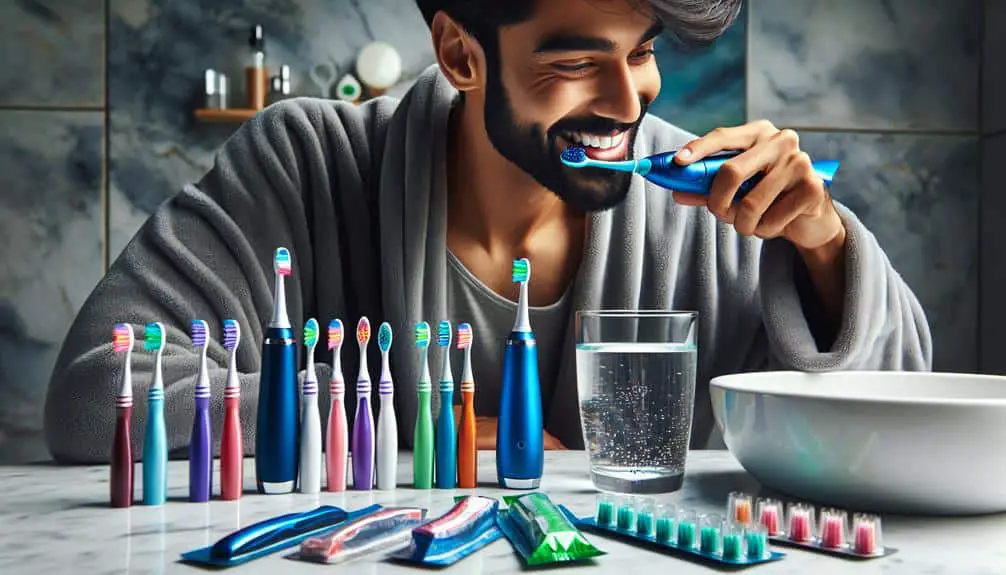To maintain radiant white teeth, brush and floss twice daily with proper techniques using a soft-bristled toothbrush and sawing motion. Avoid staining foods and drinks like coffee, tea, red wine, sodas, and berries. Incorporate whitening toothpaste with gentle abrasives like hydrogen peroxide and carbamide peroxide while following instructions for effectiveness. Schedule regular dental cleanings to prevent cavities and receive personalized oral hygiene advice. Finally, steer clear of tobacco and quit smoking to keep teeth healthy and unblemished. Implement these tips for a dazzling smile.
Key Points
- Brush and floss daily using correct techniques and a soft-bristled toothbrush.
- Limit consumption of staining foods and beverages like coffee, tea, and berries.
- Use whitening toothpaste with ADA Seal for mild stain removal and maintenance.
- Schedule regular dental cleanings to prevent plaque buildup and detect issues early.
- Avoid tobacco and smoking to preserve teeth health and prevent staining and oral diseases.
Regular Brushing and Flossing
To maintain bright white teeth, make sure you brush and floss your teeth twice a day, using proper brushing and flossing techniques as suggested by your dentist. The correct technique for brushing involves holding your toothbrush at a 45-degree angle along the gum line and using gentle circular motions. Be sure to brush all surfaces of your teeth, including the front, back, and chewing surfaces. Using a soft-bristled toothbrush is recommended to prevent enamel damage.
When it comes to flossing, it's essential to use the right technique to effectively remove plaque and food particles from between your teeth. Break off about 18 inches of floss and wrap it around your fingers, leaving a few inches to work with. Gently guide the floss between each tooth in a sawing motion, making a 'C' shape around the tooth to make sure you clean beneath the gum line.
Your dentist may suggest specific products such as fluoride toothpaste, antimicrobial mouthwash, or interdental brushes to enhance your oral care routine. Following these suggestions will help you maintain your bright white smile.
Limit Staining Foods and Beverages
Maintain your radiant white smile by being mindful of the foods and beverages that can cause staining. Staining foods and beverages can detract from the effectiveness of teeth whitening treatments and natural remedies. Here are some tips to help you limit the consumption of these items:
- Coffee and Tea: These beverages contain tannins that can lead to discoloration over time.
- Red Wine: Its deep color can stain your teeth, especially when consumed frequently.
- Sodas and Colored Juices: The artificial colors in these drinks can contribute to staining.
- Berries: While nutritious, berries like blueberries and blackberries can leave stains on your teeth due to their rich pigments.
Use Whitening Toothpaste
Make sure to incorporate a whitening toothpaste into your daily oral care routine to help maintain your radiant white smile. Whitening toothpaste contains gentle abrasives or polishing agents that can assist in removing surface stains from your teeth. These toothpaste formulations often include ingredients like hydrogen peroxide or carbamide peroxide, which are effective in breaking down stains, resulting in a brighter smile over time.
When selecting a whitening toothpaste, look for one that carries the American Dental Association (ADA) Seal of Acceptance to guarantee its safety and effectiveness. Keep in mind that whitening toothpaste is best suited for preserving the whiteness of your teeth rather than providing dramatic whitening effects. For more significant whitening results, you may want to explore other options such as professional whitening treatments or whitening strips.
Remember to follow the instructions provided with the whitening toothpaste to maximize its benefits and to avoid any potential side effects such as tooth sensitivity. Incorporating whitening toothpaste into your daily routine can be a simple yet effective way to help keep your teeth looking bright and radiant.
Schedule Regular Dental Cleanings
Regular dental cleanings play an important role in maintaining the health and brightness of your smile. These routine appointments are essential components of your oral hygiene regimen and preventive care routine. Here are four reasons why scheduling regular dental cleanings is essential:
- Professional Cleaning: Dental hygienists can remove built-up plaque and tartar that regular brushing and flossing may miss, preventing issues like cavities and gum disease.
- Early Detection of Problems: Regular dental cleanings allow dentists to identify early signs of dental problems such as decay, gum disease, or oral cancer, enabling prompt treatment and preventing further complications.
- Preventive Care: By staying proactive with regular cleanings, you're taking a preventative approach to your oral health, reducing the risk of costly and invasive procedures down the line.
- Personalized Advice: Dental professionals can provide tailored advice on improving your oral hygiene practices, recommending tools and techniques to maintain a healthy, radiant smile.
Avoid Tobacco and Smoking
To preserve the health and appearance of your teeth, it's essential to refrain from tobacco use and smoking. Quitting smoking not only benefits your overall health but also plays a significant role in maintaining excellent oral health. Tobacco products, including cigarettes and smokeless tobacco, can cause a myriad of dental issues that can impact the brightness and integrity of your teeth.
Smoking stains teeth and can lead to yellowing or browning of the enamel, which may be challenging to reverse. Additionally, it can contribute to gum disease, tooth loss, and even oral cancer. The chemicals in tobacco harm the gums, affecting the attachment of bone and soft tissue to your teeth.
Frequently Asked Questions
Can I Use Natural Remedies Like Charcoal or Baking Soda to Whiten My Teeth?
You can use natural alternatives like charcoal or baking soda to whiten your teeth. While DIY methods can be effective, professional treatments may offer quicker and more reliable results. Evaluating the pros and cons is crucial before deciding.
How Often Should I Replace My Toothbrush for Optimal Oral Health?
You should replace your toothbrush every three to four months for excellent oral health. As bristles wear out, they become less effective at cleaning your teeth. Proper care and regular replacement guarantee your brushing techniques remain in great shape.
Are There Any Specific Brands of Whitening Toothpaste That Are More Effective Than Others?
When it comes to whitening toothpaste, some brands stand out for their effectiveness in achieving brighter smiles. Check consumer reviews for insights into which brands deliver the best results. Experiment to find what works for you.
What Are Some Alternative Methods for Whitening Teeth, Such as Professional Treatments or At-Home Kits?
Looking to brighten your smile? Professional whitening treatments offer effective results, while at-home whitening kits provide a safe alternative. Consider consulting with a dentist for personalized recommendations on the best method for achieving those pearly whites.
How Can I Prevent Teeth Sensitivity While Using Whitening Products?
To prevent teeth sensitivity while using whitening products, you should consider using toothpaste designed for sensitive teeth. This can help strengthen your tooth enamel and reduce the risk of sensitivity. Also, limit the frequency of using whitening strips to prevent enamel damage.



